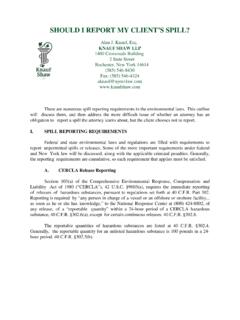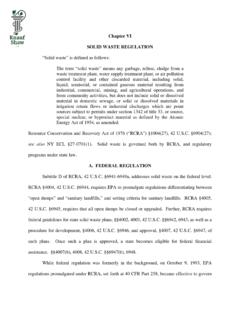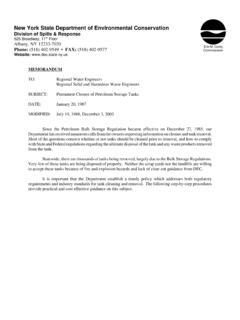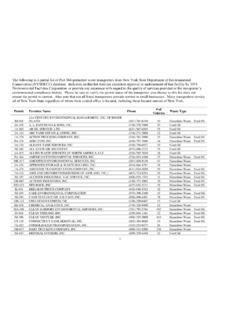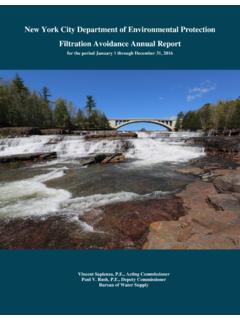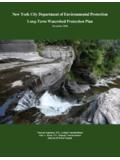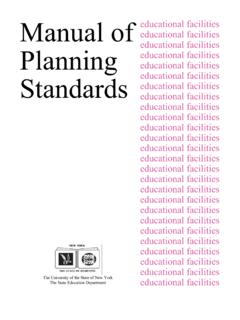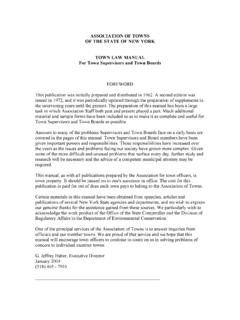Transcription of THE NEW YORK OIL SPILL LAW Navigation Law …
1 THE NEW york OIL SPILL LAW Navigation Law Article 12 Alan J. Knauf, Esq. Amy L. Reichhart, Esq. KNAUF SHAW LLP 1400 Crossroads Building 2 State Street Rochester, New york 14614 (585) 546-8430 Fax: (585) 546-4324 2010 Knauf Shaw LLP Navigation Law Article 12 (the Oil SPILL Law ) is the primary mechanism to deal with liability and cleanup for oil spills on land and water in New york State. The Oil SPILL Law, enacted in 1977, prohibits the unpermitted discharge of petroleum. It follows the same basic pattern as the later federal and state Superfund statutes, creating strict liability for [a]ny person who has discharged petroleum (a discharger ), and providing for cleanup financed by a government fund.
2 The law generally prohibits the discharge of petroleum, but does not apply to discharges in compliance with the conditions of a federal or state permit. Navigation Law 173. Special provisions relate to major facilities (including refineries, pipelines, and other facilities with a capacity greater than 400,000 gallons, Navigation Law 172(11), and coordination with the federal Oil Pollution Act of 1990. The statute is liberally construed to effect its purposes. Navigation Law 195; State v. Green, 96 403, 729 420 (2001); Henning v. Rando Machine Corp., 207 106, 620 867 (4th Dep t 1994). The Oil SPILL Law applies to spills which occurred before the statute was enacted in 1977.)
3 Navigation Law 190-a; State v. Cities Service Co., 180 940, 580 512 (3d Dep t 1992); Bologna v. Kerr-McGee Corp., 95 197 ( 2000). While liability has generally been assumed to be joint and several, under the rationale of a recent CERCLA case, Burlington Northern & Santa Fe Railway Co. v. United states , , 129 1870 (2009), it may be that courts will only find several liability where a reasonable basis for allocation can be found. Note that petroleum is excluded from the federal Superfund Law (the Comprehensive Environmental Response Compensation and Liability Act, or CERCLA ). CERCLA 101(14), 42 9601(14); see also Exxon Corporation v. Hunt, 475 355, 106 1103 (1986).
4 However, the Oil SPILL Law does not preclude the right to sue under common law theories. Navigation Law 193; Calabro v. Sun Oil Co., 276 858, 714 781 (3d Dep t 2000). I. Liability A. Strict Liability for Dischargers. Under Navigation Law 181(1), [a]ny person who has discharged petroleum shall be strictly liable, without regard to fault, for all cleanup and removal costs and all direct and indirect damages, no matter by whom There is no third party defense, so liability may be imposed on a blameless party. Merrill Transport Co. v. State, 94 39, 43, 464 249, 252 (3d Dep t 1983), mot. den d 60 555, 467 1030 (1983). The failure, unintentional or otherwise, to take any action in controlling the events that led to the SPILL or to effect an immediate cleanup renders [a defendant] liable as a discharger.
5 State v. Green, 96 403, 729 420 (2001). While the statute specifically provides that the owner or operator of a major facility or vessel which has discharged petroleum is strictly liable, the statute establishes a cap on the liability of such major facilities ( refineries) and vessels. Navigation Law 181(3). B. Discharge. Discharge is defined to include all intentional and releasing, spilling, leaking,.. of petroleum into the waters of the state or onto lands from which it might flow or drain into said Navigation Law 172(8). Those waters include all lakes, springs, streams and bodies of surface or ground water. Navigation Law 172(18). Accordingly, even spills on the land that might flow or drain into ground water are covered.
6 Unless an oil SPILL is totally enclosed indoors, it is generally considered to be a discharge encompassed by the statute, and judicial notice can be taken of the common knowledge that oil can seep through the ground into surface and and thereby cause ecological damage. Merrill Transport Co. v. State, 94 39, 43, 464 249, 252 (3d Dep t 1983), mot. den d 60 555, 467 1030 (1983); see also Niagara Mohawk Power Corp. v. Jones Chemical, Inc., 315 171 (2d Cir. 2003). However, in State v. Arthur L. Moon, Inc., 228 826, 643 760, 761 (3d Dep t 1996), mot. for leave to appeal den d 87 861, 653 282 (1996), a question of fact was raised as to whether an oil SPILL did not actually reach the groundwater or threaten to do so.
7 C. Petroleum. Petroleum is defined to include oil or petroleum of any kind and in any form including, but not limited to, oil, petroleum, fuel oil, oil sludge, oil refuse, oil mixed with other wastes and crude oils, gasoline and kerosene. Navigation Law 172(15). Thus, hydrocarbons which are commonly associated with petroleum waste, broadly construed, are encompassed within the definition of petroleum. Henning v. Rando Machine Corp., 207 106, 620 867 (4th Dep t 1994). D. Retroactive Liability. The Oil SPILL Law applies to spills which occurred before the statute was enacted in 1977. Navigation Law 190-a; State v. Cities Service Co., 180 940, 580 512 (3d Dep t 1992); Bologna v.
8 Kerr-McGee Corp., 95 197 ( 2000). E. Burden of Proof. Ordinarily, the burden of proof is on a plaintiff to show that the defendant is the discharger. In Prato v. Vigliotta, 253 749, 677 380 (2d Dep t 1998), the plaintiff s case was dismissed because he failed to rebut the defendant s affidavit and demonstrate any connection between leaks in 1983 and contamination discovered years later. However, in a California case arising under the Resource Conservation and Recovery Act where it was not clear which past or present owner controlled the tanks at the time they leaked, the burden of proof shifted to the defendants to show they were not responsible. Zands v. Nelson, 779 1254 ( Cal. 1991).
9 In Noco Energy Corp. v. Chevron USA, Inc., CV 01-CV-897 ( 2002, Skretny, J.), the court denied summary judgment against the former owners of a contaminated gas station. In Niagara Mohawk Power Corp. v. Jones Chemical, Inc., 315 171 (2d Cir. 2003), the Second Circuit affirmed summary judgment dismissing an Oil SPILL Law suit, since the plaintiff failed to offer evidence of any discharges by the defendant, since the plaintiff has not traced a drop of MVO petroleum to the soil or water. The court concluded: It certainly seems probable, as NMPC argues, that MVO's operations the storage and transfer of tens of millions of gallons of fuel oil annually at Niagara Flats and the Texaco property for 16 years cannot have been done without some seepage or leakage onto the soil, and from there to the waters of the state.
10 But it is NMPC's burden to show a discharge resulting in a release. F. Penalties. Navigation Law 192 provides for fines of up to $25,000 per day for violation of the law, such as an illegal discharge of petroleum, and [i]f the violation is of a continuing nature each day during which it continues shall constitute an additional, separate and distinct offense. See, , State v. Markowitz, 273 636, 710 407, 412 (3d Dep t 2000), lv. den d 95 770, 722 473 (2000) (lower court assessed $ million penalties). For example, in State v. LVF Realty Co., Inc., 16 1112(A), 847 899 (Sup. Ct. Nassau Co. 2007), aff d 59 519, 873 664 (2d Dep t 2009), over the objection that the punishment was a grossly excessive punishment in violation of the Due Process clause and the Eighth Amendment of the Constitution, the court upheld a fine of over $6 million for failure to investigate, contain and/or cleanup discharges.
